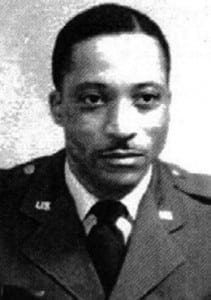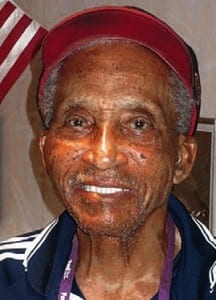
In the shadow of Pinecrest, lives a 95-year old military veteran who should be getting a lot more attention than he does. Lt. Col. Eldridge Williams has a compelling life story about overcoming

adversity and racial discrimination in order to proudly serve our country at the highest level.
Born in 1917, Williams was brought up working the land, picking cotton. His family worked on various plantations starting in Texas and eventually making their way to Kansas. Eldridge describes that work as “just above slavery, but with some hope.” From the beginning, Eldridge felt sports and education was the way for him to break free and stand tall. He made it a point to be in top physical and mental condition throughout his youth.
As World War II loomed for the U.S., another black man was about to chip away at racial inequality. On Jan. 15, 1941, Howard University student Yancy Williams (no relation) filed a court order to be allowed to enter aviation cadet flight training. The very next day, the War Department announced it would establish an aviation cadet flight-training program at Tuskegee, Alabama for blacks only. It didn’t take Eldridge Williams but 30 days to apply to become part of that program.
“I didn’t want to move boxes, wash and clean up for my military service,” he said. “Menial labor was left for the minorities to do and I knew I could provide far more service to my country. I felt it was my job to demonstrate my ability and counteract the status quo.”
Williams graduated Xavier University in August 1941 with a degree in Education and immediately reported for duty where he got in line for his aviation physical. One of five names selected, he arrived at 9 a.m. to find he was there with four white applicants. The other four went in almost immediately. Eldridge sat until just before 5 p.m. The doctor begrudgingly did the exam and looked for a way to fail him. Having played football, baseball and basketball, Williams stumped him. But when it came to the eye exam, the doctor cheated the test and failed him for “depth perception and cupping of the optic disc.” The final injustice was that the results were marked “Negro. Re-examination is NOT recommended.”
This one event is what singularly kept Eldridge from ever flying with the Tuskegee Airmen, but also defined how he would overcome for the rest of his life.
Having been shot down for Tuskegee training, Williams was sent to an all-black outfit at Fort Leonardwood, Missouri for combat engineer training. Two weeks into training he was moved to the office because they found he could type 90 words a minute, a skill he learned by earning a Business Administration degree at Western University in 1936. Eldridge thought this was another pitfall in his desire to serve, but it turned out it was just what he needed.
His office skills and hard work allowed him to become a first sergeant and, after two attempts ((thwarted by his color), he was finally slotted to go for Officer Training in Miami Beach in 1942. Once there, because of race, he had trouble going to the beach and getting a haircut. The barracks were at the Collins Plaza Hotel where, although desegregated, it was clear race was again a major impediment.
“Several times during my life I was very angry about segregation and discrimination,” recalled Eldridge. “I’d think about taking rocks to a highway overpass and dropping them on cars, but I knew that was not right. My job was to ignore and overcome by performance.”
Williams graduated Officer Training on Oct. 28, 1942 and was quickly assigned to the Tuskegee Airmen where he trained them in survival and physical fitness. Within two years, he was promoted to captain and over the course of his enlistment trained 992 officers. He never attended graduation ceremonies, still scarred by the fact that he was fraudulently denied the opportunity to become an airman himself due to the physical examination in 1941.
After the war, he took a job as the head tennis and basketball coach at A&T College. Even there, local law and rules severely punished successful blacks, so he hid under the radar and accepted less fortune than he was rightly entitled.
The military called Williams back into service during the Berlin Airlift crisis, which continued through the Korean War. During one of his deployments he was assigned to Okinawa, Japan. The orders specifically read: “Dependents will not accompany or later join Officer – for the convenience of the government.” Another reminder of the race inequality Williams had to endure.
At one point, Williams, stationed at Syracuse, was in charge of the ‘red button’ that would authorize aircraft across the entire eastern seaboard to be loaded with nuclear weapons; all the while still dealing with discrimination that denied him the ability to buy a house.
Ever since being stationed on Miami Beach, Eldridge had wanted to live in Miami. In 1964, Williams did just that and joined the Dade County Public School System where he became a director and was put in charge of school desegregation. He permanently retired in 1985.
To this day, a very vibrant and distinguished 95-year-old Williams vows to keep doing his part to improve racial equality. He says the key is education and both the majority and minority doing their part in achieving goals.
In 2009, Williams released a limited print book of his life story. Fittingly to the point of chills, it is titled Without Wings I Soared.
HAL’S HOMEOWNER HELP
What are you waiting for? If it’s time to sell your home, it doesn’t cost any more to sell with the best. I know South Florida and how to maximize the value of your home. Get in touch with me to sell your home. I’ll educate you on the latest market information.
Hal Feldman (MiamiHal) is a Realtor with RE/MAX Advance Realty. Contact him with story ideas or real estate questions at <www.MiamiHal.com>.






